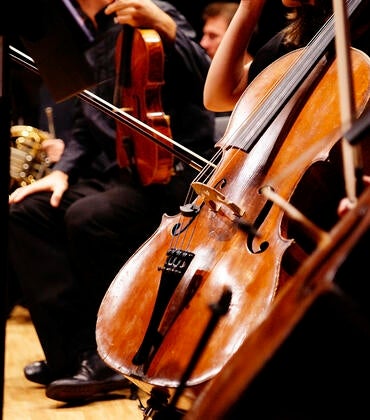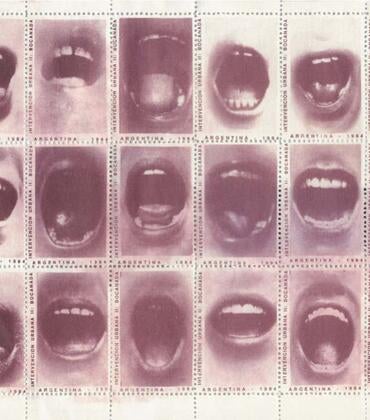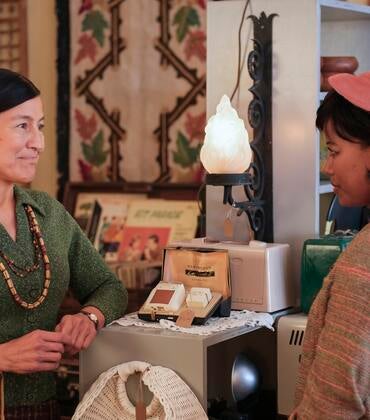Music saved Richard T. Rodríguez’s life.
The first time Rodríguez saw Boy George in a televised music video, he was in awe. The androgynous figure dressed in flamboyant attire immediately drew the attention of a then teen Rodríguez. Other British musicians such as Siouxsie and the Banshees, Adam Ant, and Soft Cell, among others, helped create a sense of place — and acceptance — as he explored his own identity and his Mexican American culture in the 1980s.
Punk music in the 1970s and 80s was associated with rebels and anti-establishment attitudes both in the United States and the United Kingdom. It was that same sense of displacement, of not “fitting in,” that allowed Mexican and Mexican American youth to connect with leading bands such as the Clash, the Sex Pistols, the Cure and the Smiths.
Now Rodríguez, 51, a professor of English and media and cultural studies at UC Riverside, has taken all this historical context and placed it into a 264-page book that perfectly interlays music, life of Latinos in Southern California, and his personal memories of growing up in the 1980s. The book, “A Kiss Across the Ocean: Transatlantic Intimacies of British Post-Punk & US Latinidad,” published by Duke University Press. This is Rodríguez’s second book.
“Each one of us has a different relationship with music and the artist. For a lot of us who grew up marginalized due to our sexuality, class, ethnicity, it resonates even more,” said Rodríguez. “When growing up, you gravitated to what gave you a sense of empowerment and that is what music did for me and for so many other people. Music saved my life.”
“A Kiss Across the Ocean,” whose title derives from Culture Club’s 1983 Long Hammersmith Odeon concert, focuses on what he defines as post-punk. For Rodríguez, the “post” in post-punk “heralds punk’s afterlives that form a genealogy” that embraces a stylistic hybridity with regards to sound, fashion, and politics.
Through musical anecdotes Rodríguez narrates his own coming of age story, sharing some of the harsher realities of family life and social discrimination and his concert-going adventures with friends in Santa Ana, Los Angeles, and beyond.
“Yes, the music helped my identity and beyond. When I first describe the scene where I’m watching Boy George on TV, I was not compelled to dress like that, but it contributed to finding who I am, who I was,” said Rodríguez, who found a passion in teaching. His dedication to mentoring has won him awards in recent years, including UCR’s Charles Weis Service Award and the Richard A. Yarborough Award.
Before the pandemic, Rodríguez participated in a Faculty-Led Education Abroad Program, or FLEAP, in Scotland. FLEAP students learned about the development of punk and post-punk music by visiting museums and accessing official and unofficial archives, all while meeting scholars, journalists and musicians.
His students encouraged him to DJ at UCR’s radio station, KUCR 88.3FM. Since 2020 he has been “Dr. Ricky on the Radio” every Thursday from 3-5 p.m., offering listeners a repertoire of 1980s hits. On Thursday, Sept. 15, he will dedicate the show to bands mentioned in “A Kiss Across the Ocean.”
Connections
Rodríguez was one of thousands of Southern California Latinos who became lifelong admirers of post-punk music and of artists such as Depeche Mode, New Order, and Siouxsie Sioux. The connection came from many angles; he argues that artists such as Siouxsie resonated with Mexican American youth because of her middle-class upbringing, feeling like a misfit because her family home was the neighborhood eyesore, or because nobody could pronounce her last name.
Siouxsie also gave Latinas an out, Rodríguez said. The hair, the sharp eyeliner, and bold lipstick gave them a sense of self-assuredness. Her music and her persona created a force field that helped repel the racial and homophobic slurs many marginalized kids encountered at school.
Another connection is Kid Congo Powers, a queer third-generation Mexican American born in La Puente, California. He was a guitarist for the Cramps, the Gun Club, and Nick Cave and the Bad Seeds. Kid grew up listening to everything from oldies to Mexican rancheras, and admits that although he did not speak Spanish, his Latino features always made him feel judged and unaccepted.
Further referencing the post-punk music connection between the UK with Southern California, Rodríguez recalls a British magazine interview with John Lydon, singer for Sex Pistols. The interviewer asks Lydon what people in America think of him and how he spent free time in Los Angeles. “I hang around with the Chicanos who are into all that cruising around in ‘50s cars. I’ve got a ’57 Caddie … so I’m going into races now — some serious stock car stuff. I love it.”
Lydon’s comments in that 1984 conversation provided the validation Rodríguez said he needed to rise above when other bands, their fans, and journalists questioned why Chicanos were interested in post-punk music, Rodríguez said.
At some point journalists became obsessed with answering why Morrissey had such a big Latino following. Rodríguez wrote this book in part to answer that question.
“I was repeatedly frustrated and annoyed. The answer is, ‘Why not?’” Rodríguez said of why he decided to pursue writing this book. “Generations of Latinos who have been listening to British music. I wanted to debunk myths and show this music appealed to kids of color, people of color; there was this difference in the music that drew us to it. It allowed us to express our originality.”
Music was also a transatlantic driver of social change, Rodríguez said. In the 1980s the United States experienced political conservatism, a recession, the HIV/AIDS epidemic, and more. Social protests were happening around the world.
One of the songs that resonated with youth was “Ghost Town” by the Specials:
“This town (town) is coming like a ghost town
Why must the youth fight against themselves?
Government leaving the youth on the shelf
This place (town) is coming like a ghost town
No job to be found in this country
Can't go on no more
The people getting angry
This town is coming like a ghost town…”
“The music brought us together,” Rodríguez said.
Book discussions with Richard T. Rodríguez:
Thursday, Sept. 15
Dr. Ricky on the Radio: Tune into KUCR 88.3FM on Thursday, Sept. 15 from 3-5 p.m. when Dr. Ricky will discuss his book and will delight listeners with a 1980s playlist.
Saturday, Sept. 17, 4 p.m.
LibroMobile — Bristol Food Court
1180 S. Bristol St.
Santa Ana, California
RSVP: https://www.libromobile.com/events. The event will be a conversation with Dr. Marlén Ríos-Hernández.
Thursday, Oct. 6, 7 p.m.
Fabulosa Books
San Francisco, California
Details: https://www.fabulosabooks.com/eventsart.html
Thursday, Oct. 20, 7 p.m.
Women and Children First Bookstore
5233 N. Clark St.
Chicago, Illinois
Details: https://www.womenandchildrenfirst.com/event/joint-person-book-launch-richard-t-rodriguez-francesca-royster?fbclid=IwAR1hC6RTxQhthP9lHR4JELUcvMKc2jc2iunHNk5-O3N3AX03e6pSBxa9qOU
Praise for “A Kiss Across the Ocean”
“This is a book written from the heart. Read it, learn, and feel. I vote for Richard T. Rodríguez, a subject close to my heart.” — Holly Johnson, artist and singer of the band Frankie Goes to Hollywood
"In this part-memoir, part-ethnography of England and SoCal in the 1980s, author Rodríguez, a professor of media and cultural studies and English at UC Riverside, investigates what binds these two seemingly disparate cultures. Starting with his own tween-age fandom of Boy George and the Culture Club, Rodríguez plumbs the depths of the passionate, sometimes tainted love affair between British post-punks and the Latinos who worship at their altar." — Suzy Exposito, Los Angeles Times
"This at-once scholarly and personal book is a moving tribute to the escapism and comfort that music can give to the most marginalized members of society: Rodríguez provides well-researched analysis of the influences on and of post-punk bands, in realms from racial politics to ethnic cultural dynamics, and also writes of his own experiences as a young fan searching for belonging. Rodríguez’s book successfully balances an intellectual understanding of the cultural ramifications of post-punk music with poignant and alluring background stories, appealing to scholars and fans alike." — Lisa Henry, Library Journal
“Breathtaking and medicinal, this is one of those surprise books that you didn’t know you needed until you read it. And after reading it (in one glorious, page-turning sitting!) there is a feeling of being fuller. It enables a heartful recall of the abundant creativity of people past and present who did everything to make minoritarian misfit sensibility and practice. In its luminosity and special vibe, A Kiss across the Ocean gives readers the tools to wonder with precision about intuitive pulls to sounds and their surrounds. This book is a powerful force for good.” — Alexandra T. Vazquez, author of The Florida Room



